Organisational Behaviour: Influence of Culture, Power, and Politics
VerifiedAdded on 2023/06/04
|14
|4906
|339
Report
AI Summary
This report delves into the intricacies of organisational behaviour, examining how culture, politics, and power dynamics influence individual and team performance within the context of Merchant and Mills, a UK-based clothing manufacturer. The report analyzes the impact of organisational culture, including material, social, and ideological aspects, on employee behaviour and productivity. It also explores the influence of different types of organisational politics, such as "the woods," "the weed," "the high ground," and "the rock," and various sources of power, including legitimate, reward, coercive, and expert power. Furthermore, the report evaluates content and process theories of motivation, such as Maslow's hierarchy of needs, and their application in achieving organisational goals. It differentiates between effective and ineffective teams, analyzing team development theories to foster cooperation. The report concludes with an application of organisational behaviour concepts to the current situation of Merchant and Mills, providing recommendations to improve business performance and productivity.
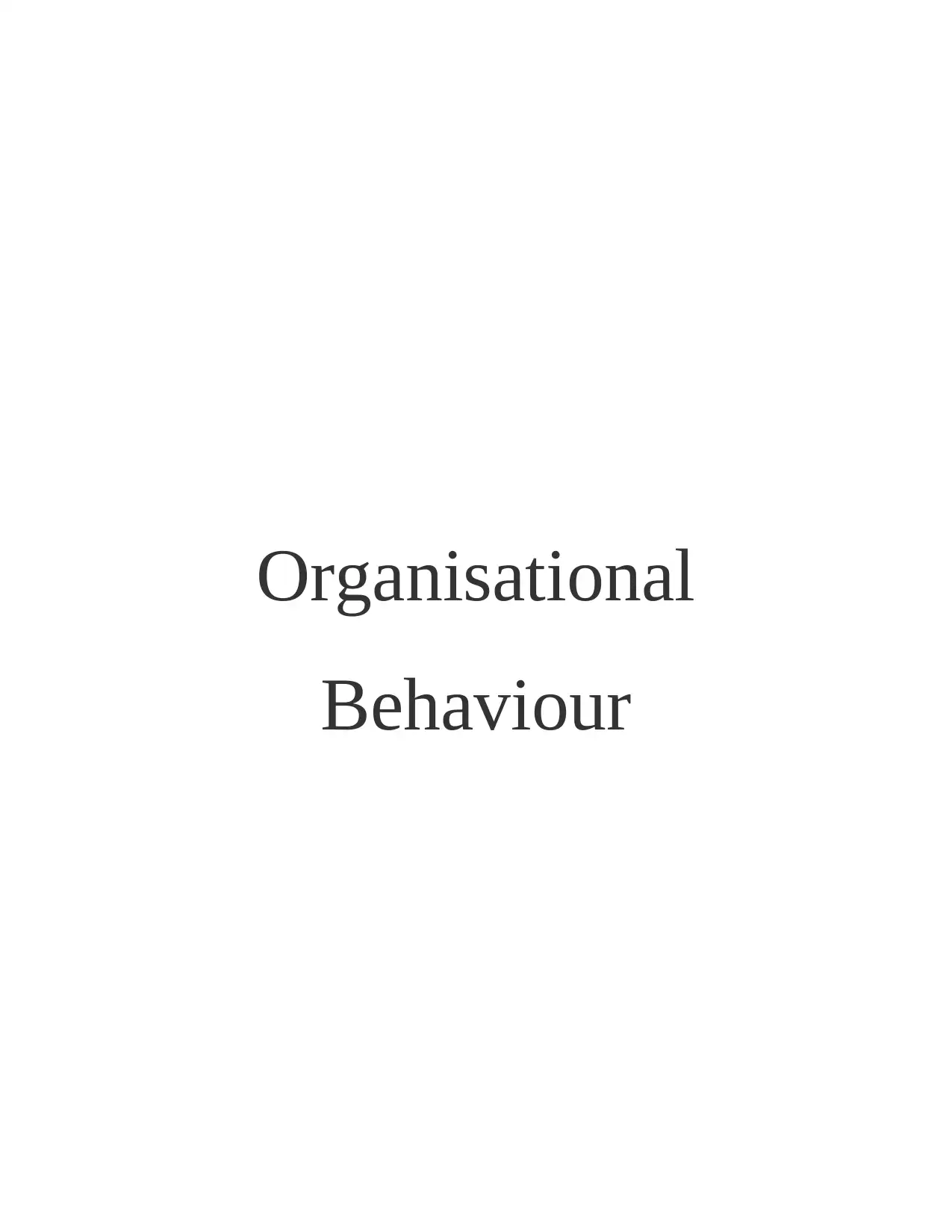
Organisational
Behaviour
Behaviour
Paraphrase This Document
Need a fresh take? Get an instant paraphrase of this document with our AI Paraphraser
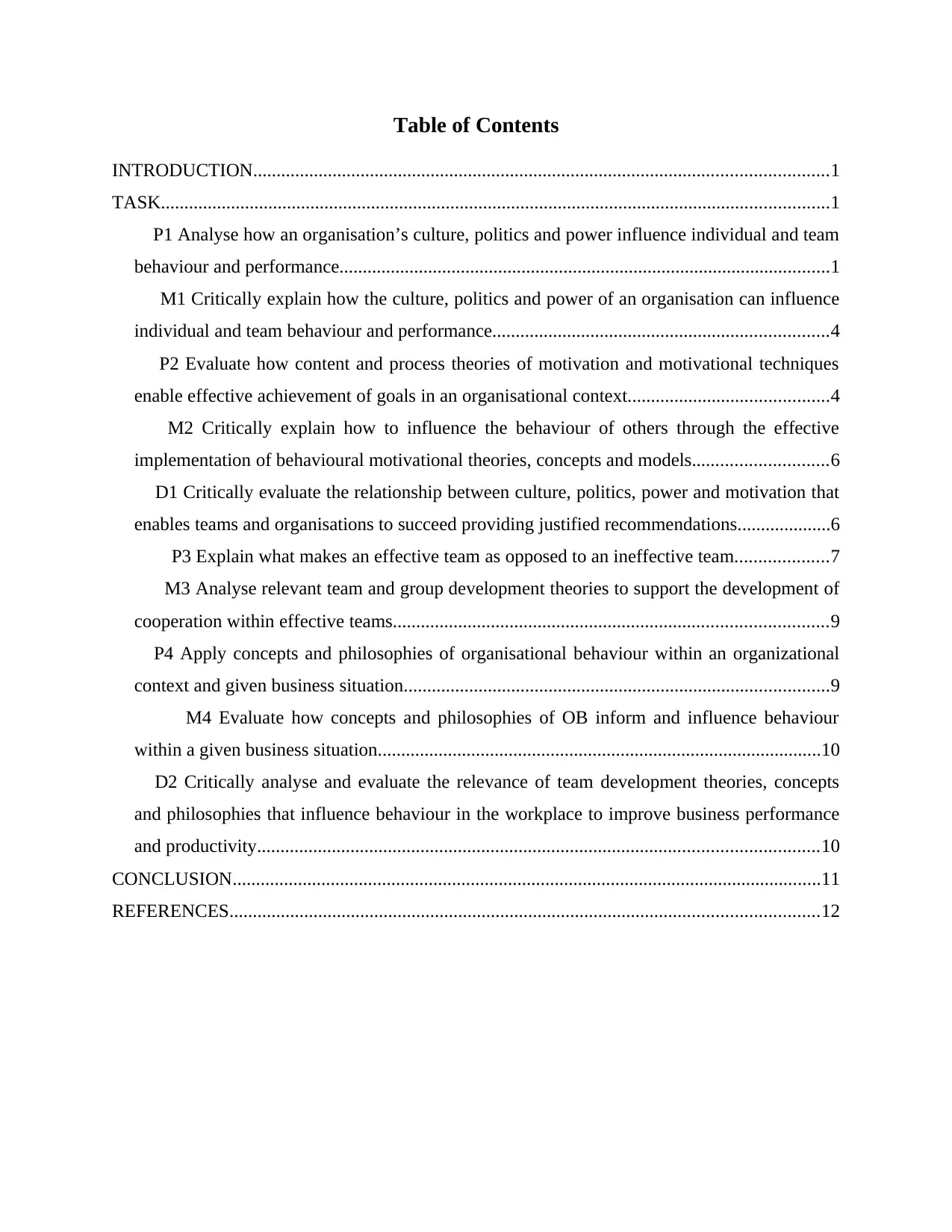
Table of Contents
INTRODUCTION...........................................................................................................................1
TASK...............................................................................................................................................1
P1 Analyse how an organisation’s culture, politics and power influence individual and team
behaviour and performance.........................................................................................................1
M1 Critically explain how the culture, politics and power of an organisation can influence
individual and team behaviour and performance........................................................................4
P2 Evaluate how content and process theories of motivation and motivational techniques
enable effective achievement of goals in an organisational context...........................................4
M2 Critically explain how to influence the behaviour of others through the effective
implementation of behavioural motivational theories, concepts and models.............................6
D1 Critically evaluate the relationship between culture, politics, power and motivation that
enables teams and organisations to succeed providing justified recommendations....................6
P3 Explain what makes an effective team as opposed to an ineffective team....................7
M3 Analyse relevant team and group development theories to support the development of
cooperation within effective teams.............................................................................................9
P4 Apply concepts and philosophies of organisational behaviour within an organizational
context and given business situation...........................................................................................9
M4 Evaluate how concepts and philosophies of OB inform and influence behaviour
within a given business situation...............................................................................................10
D2 Critically analyse and evaluate the relevance of team development theories, concepts
and philosophies that influence behaviour in the workplace to improve business performance
and productivity........................................................................................................................10
CONCLUSION..............................................................................................................................11
REFERENCES..............................................................................................................................12
INTRODUCTION...........................................................................................................................1
TASK...............................................................................................................................................1
P1 Analyse how an organisation’s culture, politics and power influence individual and team
behaviour and performance.........................................................................................................1
M1 Critically explain how the culture, politics and power of an organisation can influence
individual and team behaviour and performance........................................................................4
P2 Evaluate how content and process theories of motivation and motivational techniques
enable effective achievement of goals in an organisational context...........................................4
M2 Critically explain how to influence the behaviour of others through the effective
implementation of behavioural motivational theories, concepts and models.............................6
D1 Critically evaluate the relationship between culture, politics, power and motivation that
enables teams and organisations to succeed providing justified recommendations....................6
P3 Explain what makes an effective team as opposed to an ineffective team....................7
M3 Analyse relevant team and group development theories to support the development of
cooperation within effective teams.............................................................................................9
P4 Apply concepts and philosophies of organisational behaviour within an organizational
context and given business situation...........................................................................................9
M4 Evaluate how concepts and philosophies of OB inform and influence behaviour
within a given business situation...............................................................................................10
D2 Critically analyse and evaluate the relevance of team development theories, concepts
and philosophies that influence behaviour in the workplace to improve business performance
and productivity........................................................................................................................10
CONCLUSION..............................................................................................................................11
REFERENCES..............................................................................................................................12
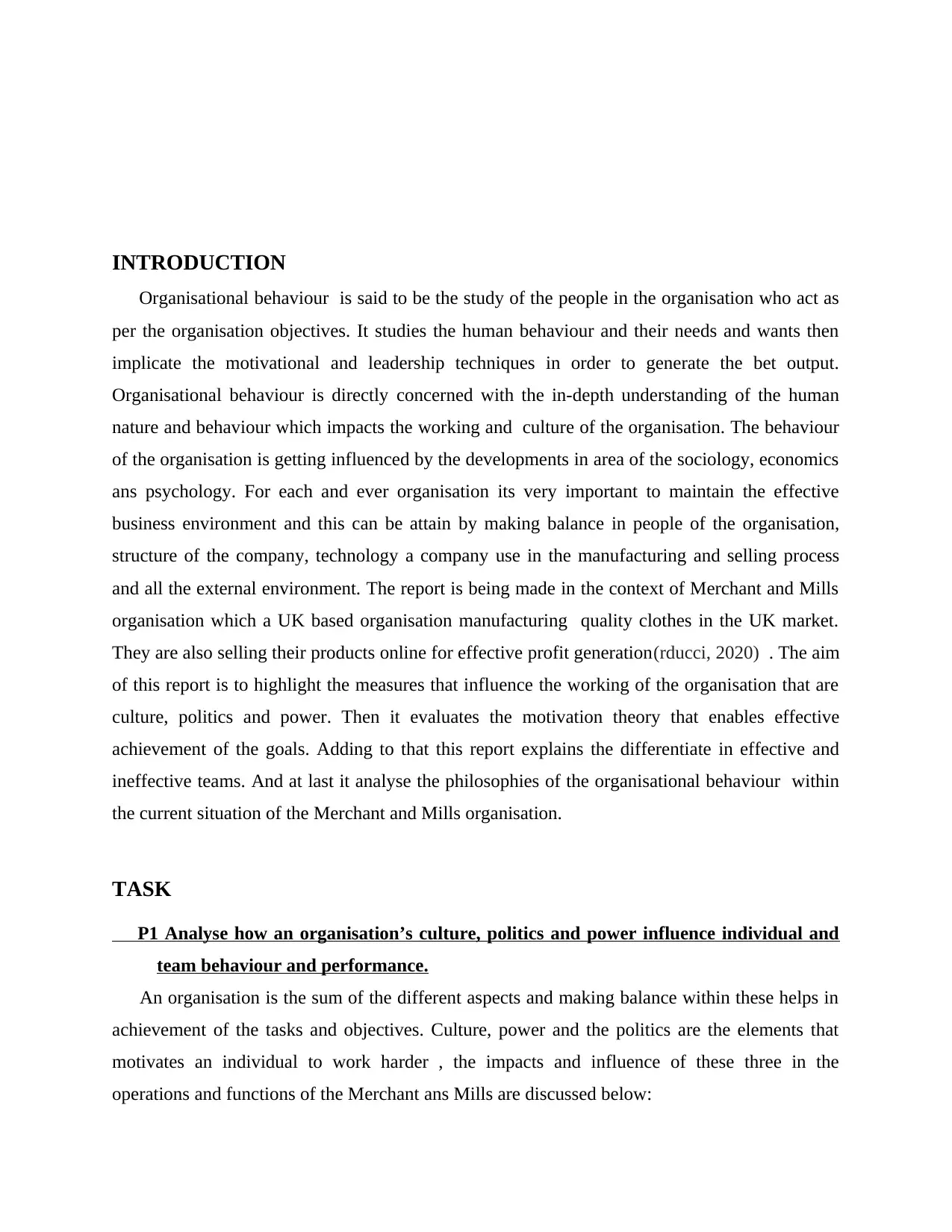
INTRODUCTION
Organisational behaviour is said to be the study of the people in the organisation who act as
per the organisation objectives. It studies the human behaviour and their needs and wants then
implicate the motivational and leadership techniques in order to generate the bet output.
Organisational behaviour is directly concerned with the in-depth understanding of the human
nature and behaviour which impacts the working and culture of the organisation. The behaviour
of the organisation is getting influenced by the developments in area of the sociology, economics
ans psychology. For each and ever organisation its very important to maintain the effective
business environment and this can be attain by making balance in people of the organisation,
structure of the company, technology a company use in the manufacturing and selling process
and all the external environment. The report is being made in the context of Merchant and Mills
organisation which a UK based organisation manufacturing quality clothes in the UK market.
They are also selling their products online for effective profit generation(rducci, 2020) . The aim
of this report is to highlight the measures that influence the working of the organisation that are
culture, politics and power. Then it evaluates the motivation theory that enables effective
achievement of the goals. Adding to that this report explains the differentiate in effective and
ineffective teams. And at last it analyse the philosophies of the organisational behaviour within
the current situation of the Merchant and Mills organisation.
TASK
P1 Analyse how an organisation’s culture, politics and power influence individual and
team behaviour and performance.
An organisation is the sum of the different aspects and making balance within these helps in
achievement of the tasks and objectives. Culture, power and the politics are the elements that
motivates an individual to work harder , the impacts and influence of these three in the
operations and functions of the Merchant ans Mills are discussed below:
Organisational behaviour is said to be the study of the people in the organisation who act as
per the organisation objectives. It studies the human behaviour and their needs and wants then
implicate the motivational and leadership techniques in order to generate the bet output.
Organisational behaviour is directly concerned with the in-depth understanding of the human
nature and behaviour which impacts the working and culture of the organisation. The behaviour
of the organisation is getting influenced by the developments in area of the sociology, economics
ans psychology. For each and ever organisation its very important to maintain the effective
business environment and this can be attain by making balance in people of the organisation,
structure of the company, technology a company use in the manufacturing and selling process
and all the external environment. The report is being made in the context of Merchant and Mills
organisation which a UK based organisation manufacturing quality clothes in the UK market.
They are also selling their products online for effective profit generation(rducci, 2020) . The aim
of this report is to highlight the measures that influence the working of the organisation that are
culture, politics and power. Then it evaluates the motivation theory that enables effective
achievement of the goals. Adding to that this report explains the differentiate in effective and
ineffective teams. And at last it analyse the philosophies of the organisational behaviour within
the current situation of the Merchant and Mills organisation.
TASK
P1 Analyse how an organisation’s culture, politics and power influence individual and
team behaviour and performance.
An organisation is the sum of the different aspects and making balance within these helps in
achievement of the tasks and objectives. Culture, power and the politics are the elements that
motivates an individual to work harder , the impacts and influence of these three in the
operations and functions of the Merchant ans Mills are discussed below:
⊘ This is a preview!⊘
Do you want full access?
Subscribe today to unlock all pages.

Trusted by 1+ million students worldwide
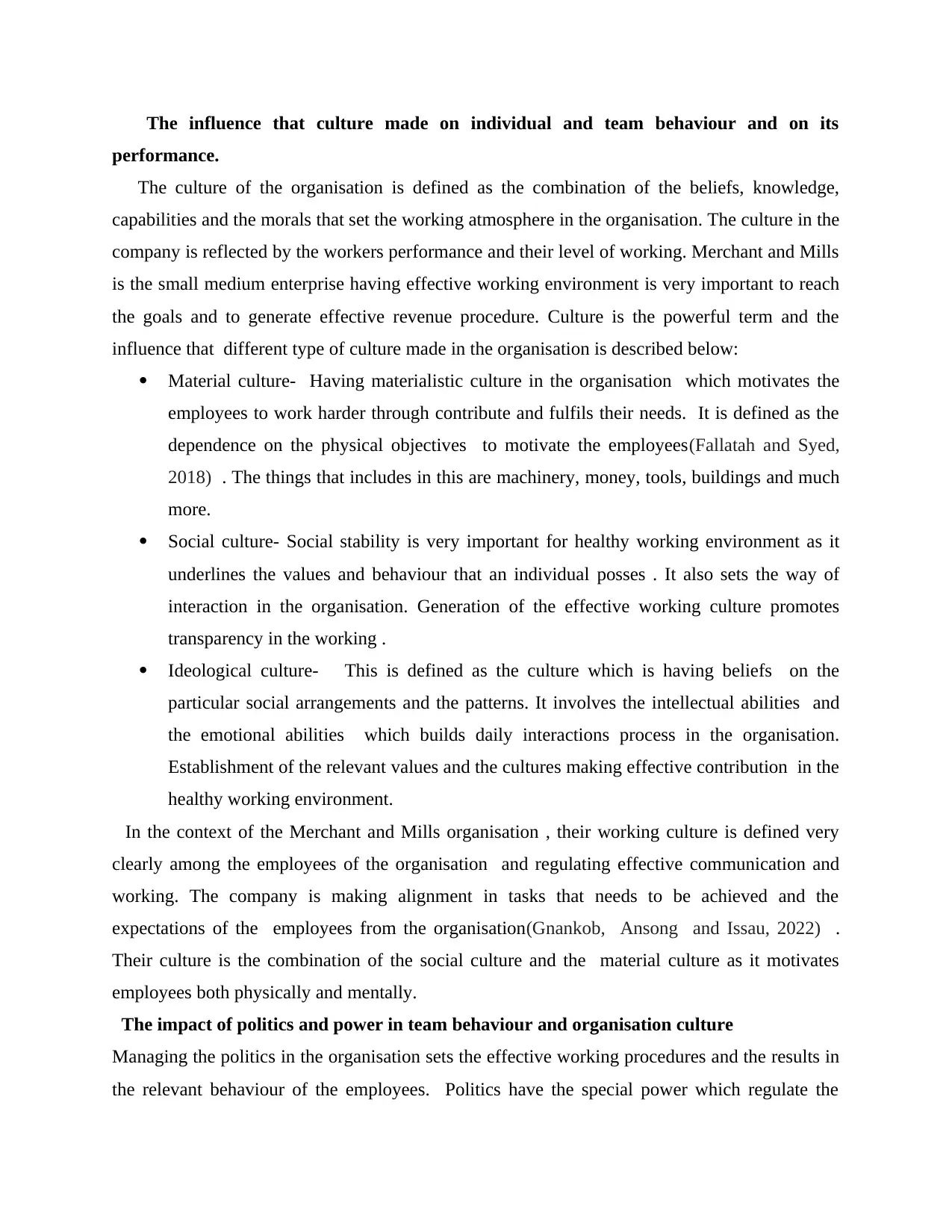
The influence that culture made on individual and team behaviour and on its
performance.
The culture of the organisation is defined as the combination of the beliefs, knowledge,
capabilities and the morals that set the working atmosphere in the organisation. The culture in the
company is reflected by the workers performance and their level of working. Merchant and Mills
is the small medium enterprise having effective working environment is very important to reach
the goals and to generate effective revenue procedure. Culture is the powerful term and the
influence that different type of culture made in the organisation is described below:
Material culture- Having materialistic culture in the organisation which motivates the
employees to work harder through contribute and fulfils their needs. It is defined as the
dependence on the physical objectives to motivate the employees(Fallatah and Syed,
2018) . The things that includes in this are machinery, money, tools, buildings and much
more.
Social culture- Social stability is very important for healthy working environment as it
underlines the values and behaviour that an individual posses . It also sets the way of
interaction in the organisation. Generation of the effective working culture promotes
transparency in the working .
Ideological culture- This is defined as the culture which is having beliefs on the
particular social arrangements and the patterns. It involves the intellectual abilities and
the emotional abilities which builds daily interactions process in the organisation.
Establishment of the relevant values and the cultures making effective contribution in the
healthy working environment.
In the context of the Merchant and Mills organisation , their working culture is defined very
clearly among the employees of the organisation and regulating effective communication and
working. The company is making alignment in tasks that needs to be achieved and the
expectations of the employees from the organisation(Gnankob, Ansong and Issau, 2022) .
Their culture is the combination of the social culture and the material culture as it motivates
employees both physically and mentally.
The impact of politics and power in team behaviour and organisation culture
Managing the politics in the organisation sets the effective working procedures and the results in
the relevant behaviour of the employees. Politics have the special power which regulate the
performance.
The culture of the organisation is defined as the combination of the beliefs, knowledge,
capabilities and the morals that set the working atmosphere in the organisation. The culture in the
company is reflected by the workers performance and their level of working. Merchant and Mills
is the small medium enterprise having effective working environment is very important to reach
the goals and to generate effective revenue procedure. Culture is the powerful term and the
influence that different type of culture made in the organisation is described below:
Material culture- Having materialistic culture in the organisation which motivates the
employees to work harder through contribute and fulfils their needs. It is defined as the
dependence on the physical objectives to motivate the employees(Fallatah and Syed,
2018) . The things that includes in this are machinery, money, tools, buildings and much
more.
Social culture- Social stability is very important for healthy working environment as it
underlines the values and behaviour that an individual posses . It also sets the way of
interaction in the organisation. Generation of the effective working culture promotes
transparency in the working .
Ideological culture- This is defined as the culture which is having beliefs on the
particular social arrangements and the patterns. It involves the intellectual abilities and
the emotional abilities which builds daily interactions process in the organisation.
Establishment of the relevant values and the cultures making effective contribution in the
healthy working environment.
In the context of the Merchant and Mills organisation , their working culture is defined very
clearly among the employees of the organisation and regulating effective communication and
working. The company is making alignment in tasks that needs to be achieved and the
expectations of the employees from the organisation(Gnankob, Ansong and Issau, 2022) .
Their culture is the combination of the social culture and the material culture as it motivates
employees both physically and mentally.
The impact of politics and power in team behaviour and organisation culture
Managing the politics in the organisation sets the effective working procedures and the results in
the relevant behaviour of the employees. Politics have the special power which regulate the
Paraphrase This Document
Need a fresh take? Get an instant paraphrase of this document with our AI Paraphraser
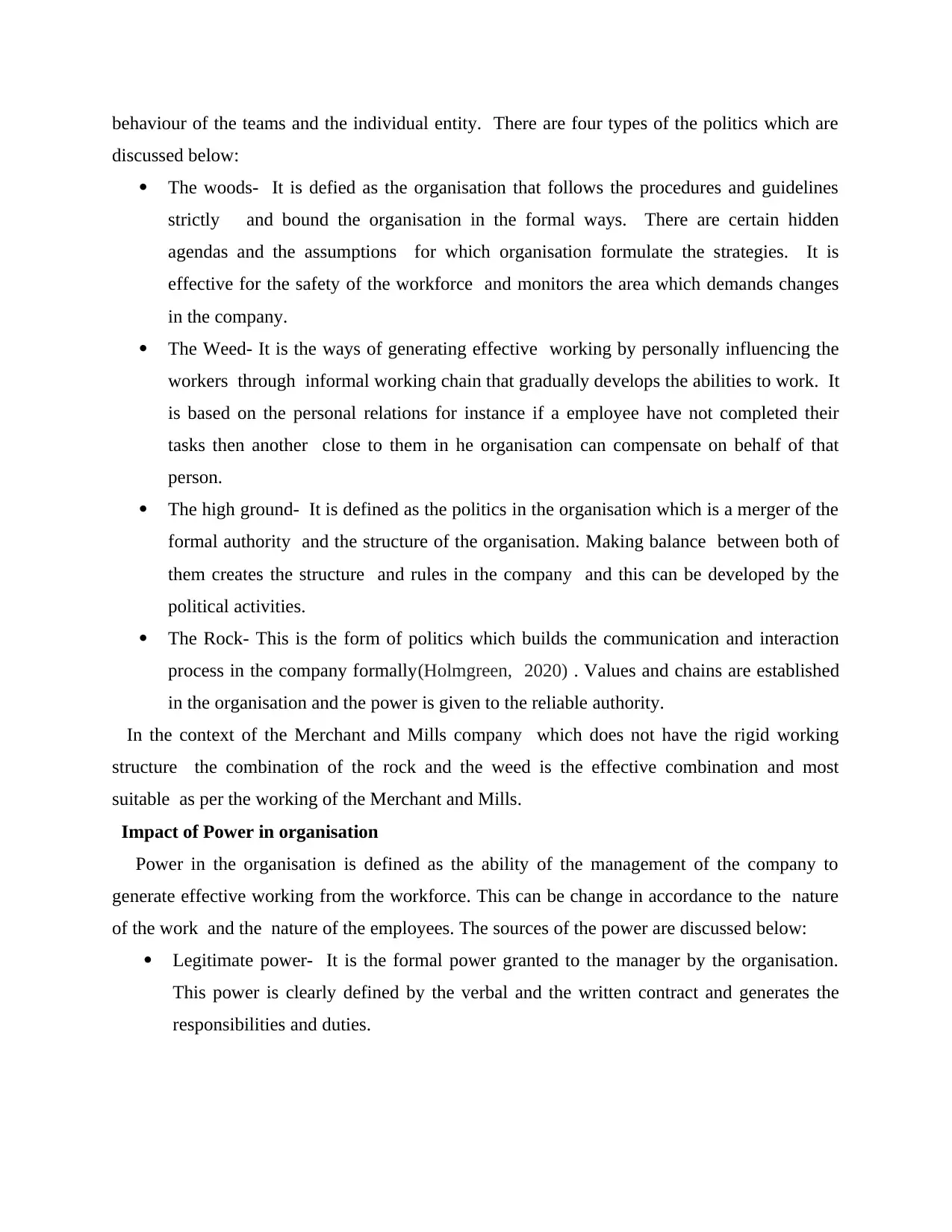
behaviour of the teams and the individual entity. There are four types of the politics which are
discussed below:
The woods- It is defied as the organisation that follows the procedures and guidelines
strictly and bound the organisation in the formal ways. There are certain hidden
agendas and the assumptions for which organisation formulate the strategies. It is
effective for the safety of the workforce and monitors the area which demands changes
in the company.
The Weed- It is the ways of generating effective working by personally influencing the
workers through informal working chain that gradually develops the abilities to work. It
is based on the personal relations for instance if a employee have not completed their
tasks then another close to them in he organisation can compensate on behalf of that
person.
The high ground- It is defined as the politics in the organisation which is a merger of the
formal authority and the structure of the organisation. Making balance between both of
them creates the structure and rules in the company and this can be developed by the
political activities.
The Rock- This is the form of politics which builds the communication and interaction
process in the company formally(Holmgreen, 2020) . Values and chains are established
in the organisation and the power is given to the reliable authority.
In the context of the Merchant and Mills company which does not have the rigid working
structure the combination of the rock and the weed is the effective combination and most
suitable as per the working of the Merchant and Mills.
Impact of Power in organisation
Power in the organisation is defined as the ability of the management of the company to
generate effective working from the workforce. This can be change in accordance to the nature
of the work and the nature of the employees. The sources of the power are discussed below:
Legitimate power- It is the formal power granted to the manager by the organisation.
This power is clearly defined by the verbal and the written contract and generates the
responsibilities and duties.
discussed below:
The woods- It is defied as the organisation that follows the procedures and guidelines
strictly and bound the organisation in the formal ways. There are certain hidden
agendas and the assumptions for which organisation formulate the strategies. It is
effective for the safety of the workforce and monitors the area which demands changes
in the company.
The Weed- It is the ways of generating effective working by personally influencing the
workers through informal working chain that gradually develops the abilities to work. It
is based on the personal relations for instance if a employee have not completed their
tasks then another close to them in he organisation can compensate on behalf of that
person.
The high ground- It is defined as the politics in the organisation which is a merger of the
formal authority and the structure of the organisation. Making balance between both of
them creates the structure and rules in the company and this can be developed by the
political activities.
The Rock- This is the form of politics which builds the communication and interaction
process in the company formally(Holmgreen, 2020) . Values and chains are established
in the organisation and the power is given to the reliable authority.
In the context of the Merchant and Mills company which does not have the rigid working
structure the combination of the rock and the weed is the effective combination and most
suitable as per the working of the Merchant and Mills.
Impact of Power in organisation
Power in the organisation is defined as the ability of the management of the company to
generate effective working from the workforce. This can be change in accordance to the nature
of the work and the nature of the employees. The sources of the power are discussed below:
Legitimate power- It is the formal power granted to the manager by the organisation.
This power is clearly defined by the verbal and the written contract and generates the
responsibilities and duties.
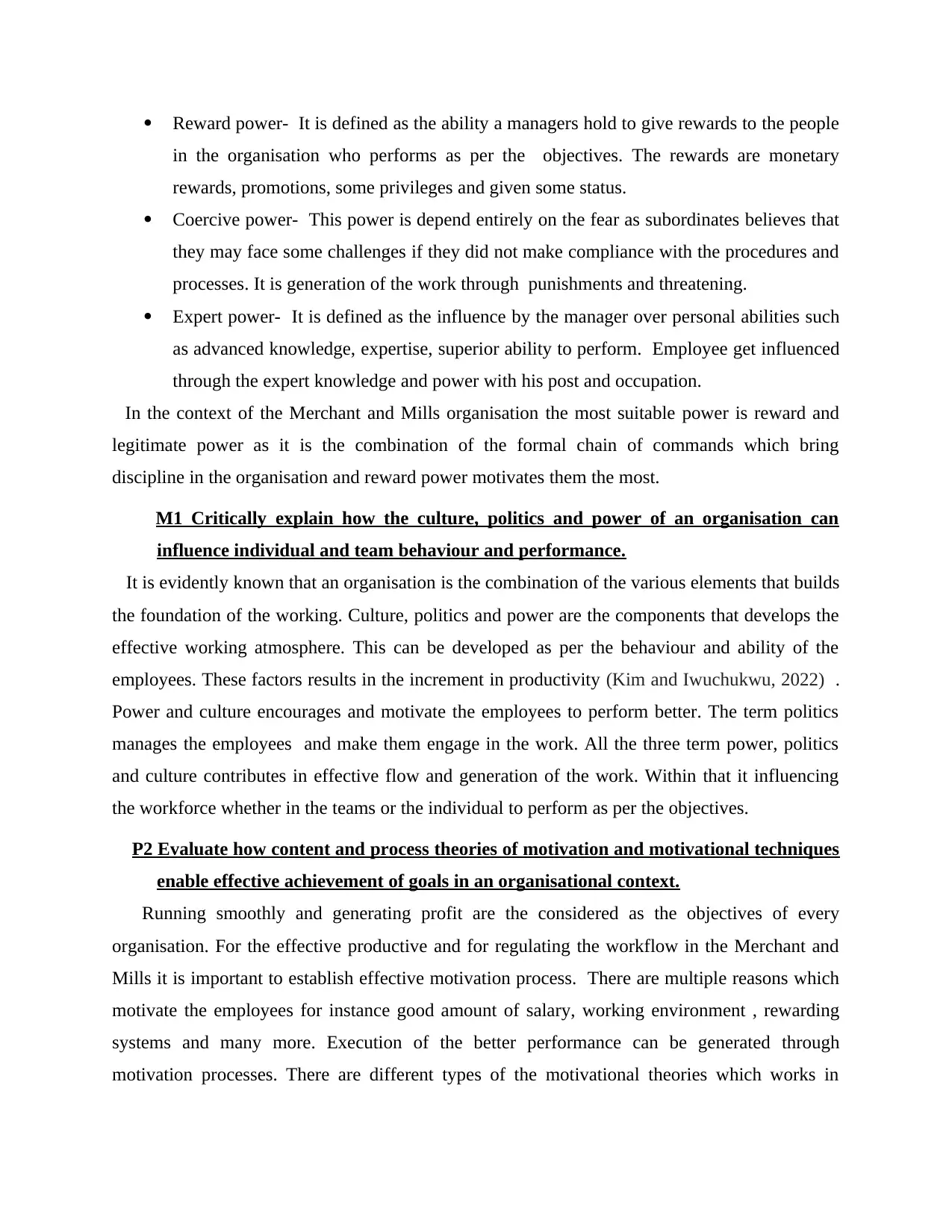
Reward power- It is defined as the ability a managers hold to give rewards to the people
in the organisation who performs as per the objectives. The rewards are monetary
rewards, promotions, some privileges and given some status.
Coercive power- This power is depend entirely on the fear as subordinates believes that
they may face some challenges if they did not make compliance with the procedures and
processes. It is generation of the work through punishments and threatening.
Expert power- It is defined as the influence by the manager over personal abilities such
as advanced knowledge, expertise, superior ability to perform. Employee get influenced
through the expert knowledge and power with his post and occupation.
In the context of the Merchant and Mills organisation the most suitable power is reward and
legitimate power as it is the combination of the formal chain of commands which bring
discipline in the organisation and reward power motivates them the most.
M1 Critically explain how the culture, politics and power of an organisation can
influence individual and team behaviour and performance.
It is evidently known that an organisation is the combination of the various elements that builds
the foundation of the working. Culture, politics and power are the components that develops the
effective working atmosphere. This can be developed as per the behaviour and ability of the
employees. These factors results in the increment in productivity (Kim and Iwuchukwu, 2022) .
Power and culture encourages and motivate the employees to perform better. The term politics
manages the employees and make them engage in the work. All the three term power, politics
and culture contributes in effective flow and generation of the work. Within that it influencing
the workforce whether in the teams or the individual to perform as per the objectives.
P2 Evaluate how content and process theories of motivation and motivational techniques
enable effective achievement of goals in an organisational context.
Running smoothly and generating profit are the considered as the objectives of every
organisation. For the effective productive and for regulating the workflow in the Merchant and
Mills it is important to establish effective motivation process. There are multiple reasons which
motivate the employees for instance good amount of salary, working environment , rewarding
systems and many more. Execution of the better performance can be generated through
motivation processes. There are different types of the motivational theories which works in
in the organisation who performs as per the objectives. The rewards are monetary
rewards, promotions, some privileges and given some status.
Coercive power- This power is depend entirely on the fear as subordinates believes that
they may face some challenges if they did not make compliance with the procedures and
processes. It is generation of the work through punishments and threatening.
Expert power- It is defined as the influence by the manager over personal abilities such
as advanced knowledge, expertise, superior ability to perform. Employee get influenced
through the expert knowledge and power with his post and occupation.
In the context of the Merchant and Mills organisation the most suitable power is reward and
legitimate power as it is the combination of the formal chain of commands which bring
discipline in the organisation and reward power motivates them the most.
M1 Critically explain how the culture, politics and power of an organisation can
influence individual and team behaviour and performance.
It is evidently known that an organisation is the combination of the various elements that builds
the foundation of the working. Culture, politics and power are the components that develops the
effective working atmosphere. This can be developed as per the behaviour and ability of the
employees. These factors results in the increment in productivity (Kim and Iwuchukwu, 2022) .
Power and culture encourages and motivate the employees to perform better. The term politics
manages the employees and make them engage in the work. All the three term power, politics
and culture contributes in effective flow and generation of the work. Within that it influencing
the workforce whether in the teams or the individual to perform as per the objectives.
P2 Evaluate how content and process theories of motivation and motivational techniques
enable effective achievement of goals in an organisational context.
Running smoothly and generating profit are the considered as the objectives of every
organisation. For the effective productive and for regulating the workflow in the Merchant and
Mills it is important to establish effective motivation process. There are multiple reasons which
motivate the employees for instance good amount of salary, working environment , rewarding
systems and many more. Execution of the better performance can be generated through
motivation processes. There are different types of the motivational theories which works in
⊘ This is a preview!⊘
Do you want full access?
Subscribe today to unlock all pages.

Trusted by 1+ million students worldwide
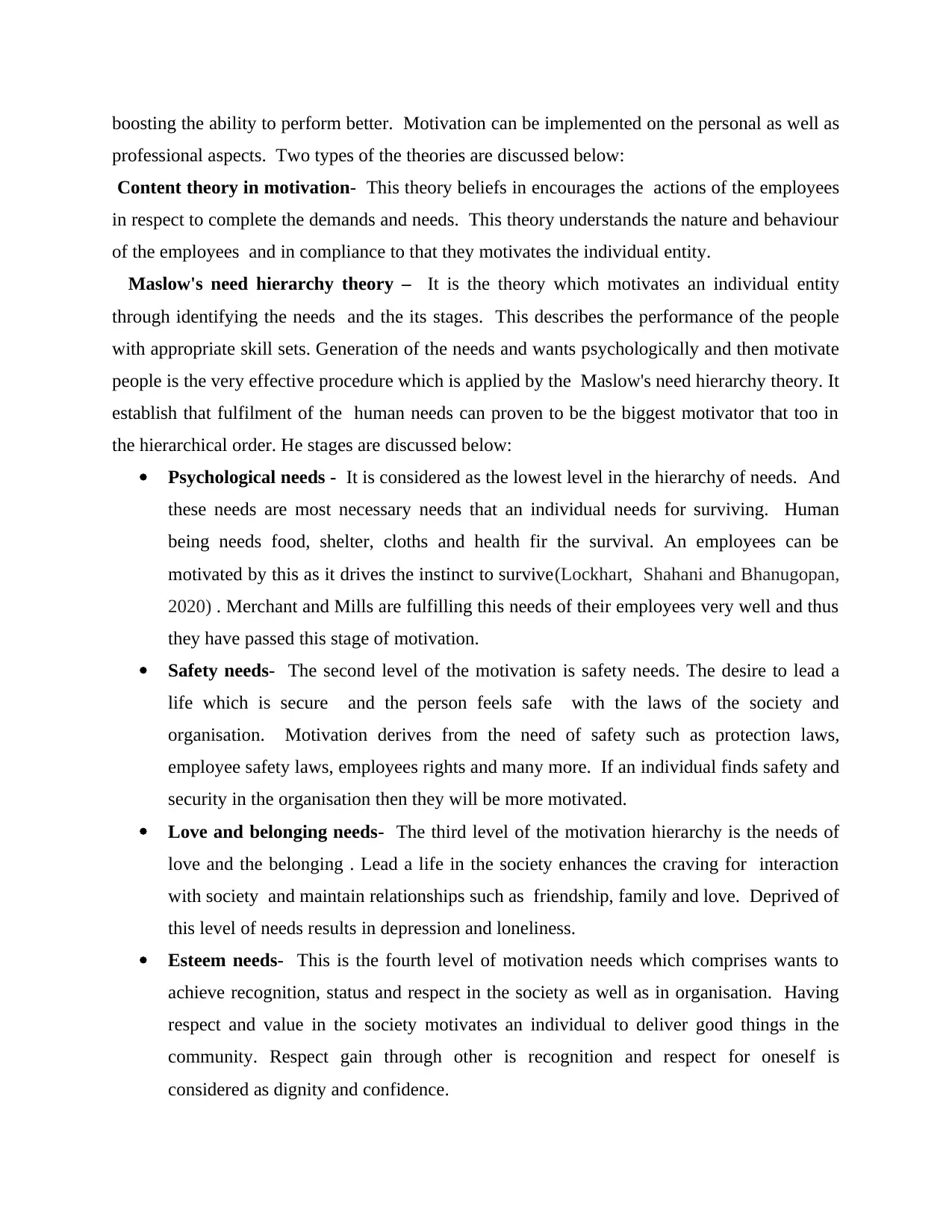
boosting the ability to perform better. Motivation can be implemented on the personal as well as
professional aspects. Two types of the theories are discussed below:
Content theory in motivation- This theory beliefs in encourages the actions of the employees
in respect to complete the demands and needs. This theory understands the nature and behaviour
of the employees and in compliance to that they motivates the individual entity.
Maslow's need hierarchy theory – It is the theory which motivates an individual entity
through identifying the needs and the its stages. This describes the performance of the people
with appropriate skill sets. Generation of the needs and wants psychologically and then motivate
people is the very effective procedure which is applied by the Maslow's need hierarchy theory. It
establish that fulfilment of the human needs can proven to be the biggest motivator that too in
the hierarchical order. He stages are discussed below:
Psychological needs - It is considered as the lowest level in the hierarchy of needs. And
these needs are most necessary needs that an individual needs for surviving. Human
being needs food, shelter, cloths and health fir the survival. An employees can be
motivated by this as it drives the instinct to survive(Lockhart, Shahani and Bhanugopan,
2020) . Merchant and Mills are fulfilling this needs of their employees very well and thus
they have passed this stage of motivation.
Safety needs- The second level of the motivation is safety needs. The desire to lead a
life which is secure and the person feels safe with the laws of the society and
organisation. Motivation derives from the need of safety such as protection laws,
employee safety laws, employees rights and many more. If an individual finds safety and
security in the organisation then they will be more motivated.
Love and belonging needs- The third level of the motivation hierarchy is the needs of
love and the belonging . Lead a life in the society enhances the craving for interaction
with society and maintain relationships such as friendship, family and love. Deprived of
this level of needs results in depression and loneliness.
Esteem needs- This is the fourth level of motivation needs which comprises wants to
achieve recognition, status and respect in the society as well as in organisation. Having
respect and value in the society motivates an individual to deliver good things in the
community. Respect gain through other is recognition and respect for oneself is
considered as dignity and confidence.
professional aspects. Two types of the theories are discussed below:
Content theory in motivation- This theory beliefs in encourages the actions of the employees
in respect to complete the demands and needs. This theory understands the nature and behaviour
of the employees and in compliance to that they motivates the individual entity.
Maslow's need hierarchy theory – It is the theory which motivates an individual entity
through identifying the needs and the its stages. This describes the performance of the people
with appropriate skill sets. Generation of the needs and wants psychologically and then motivate
people is the very effective procedure which is applied by the Maslow's need hierarchy theory. It
establish that fulfilment of the human needs can proven to be the biggest motivator that too in
the hierarchical order. He stages are discussed below:
Psychological needs - It is considered as the lowest level in the hierarchy of needs. And
these needs are most necessary needs that an individual needs for surviving. Human
being needs food, shelter, cloths and health fir the survival. An employees can be
motivated by this as it drives the instinct to survive(Lockhart, Shahani and Bhanugopan,
2020) . Merchant and Mills are fulfilling this needs of their employees very well and thus
they have passed this stage of motivation.
Safety needs- The second level of the motivation is safety needs. The desire to lead a
life which is secure and the person feels safe with the laws of the society and
organisation. Motivation derives from the need of safety such as protection laws,
employee safety laws, employees rights and many more. If an individual finds safety and
security in the organisation then they will be more motivated.
Love and belonging needs- The third level of the motivation hierarchy is the needs of
love and the belonging . Lead a life in the society enhances the craving for interaction
with society and maintain relationships such as friendship, family and love. Deprived of
this level of needs results in depression and loneliness.
Esteem needs- This is the fourth level of motivation needs which comprises wants to
achieve recognition, status and respect in the society as well as in organisation. Having
respect and value in the society motivates an individual to deliver good things in the
community. Respect gain through other is recognition and respect for oneself is
considered as dignity and confidence.
Paraphrase This Document
Need a fresh take? Get an instant paraphrase of this document with our AI Paraphraser
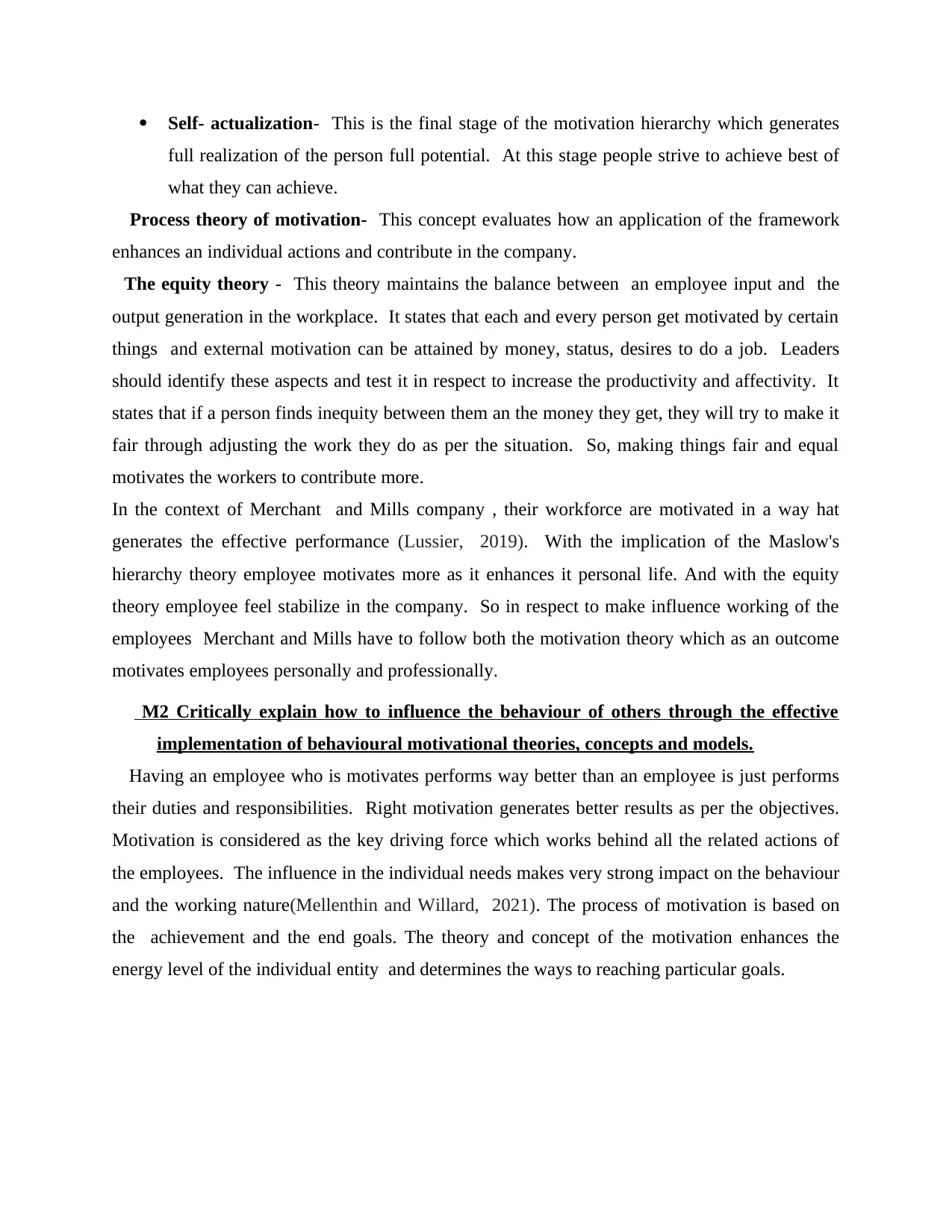
Self- actualization- This is the final stage of the motivation hierarchy which generates
full realization of the person full potential. At this stage people strive to achieve best of
what they can achieve.
Process theory of motivation- This concept evaluates how an application of the framework
enhances an individual actions and contribute in the company.
The equity theory - This theory maintains the balance between an employee input and the
output generation in the workplace. It states that each and every person get motivated by certain
things and external motivation can be attained by money, status, desires to do a job. Leaders
should identify these aspects and test it in respect to increase the productivity and affectivity. It
states that if a person finds inequity between them an the money they get, they will try to make it
fair through adjusting the work they do as per the situation. So, making things fair and equal
motivates the workers to contribute more.
In the context of Merchant and Mills company , their workforce are motivated in a way hat
generates the effective performance (Lussier, 2019). With the implication of the Maslow's
hierarchy theory employee motivates more as it enhances it personal life. And with the equity
theory employee feel stabilize in the company. So in respect to make influence working of the
employees Merchant and Mills have to follow both the motivation theory which as an outcome
motivates employees personally and professionally.
M2 Critically explain how to influence the behaviour of others through the effective
implementation of behavioural motivational theories, concepts and models.
Having an employee who is motivates performs way better than an employee is just performs
their duties and responsibilities. Right motivation generates better results as per the objectives.
Motivation is considered as the key driving force which works behind all the related actions of
the employees. The influence in the individual needs makes very strong impact on the behaviour
and the working nature(Mellenthin and Willard, 2021). The process of motivation is based on
the achievement and the end goals. The theory and concept of the motivation enhances the
energy level of the individual entity and determines the ways to reaching particular goals.
full realization of the person full potential. At this stage people strive to achieve best of
what they can achieve.
Process theory of motivation- This concept evaluates how an application of the framework
enhances an individual actions and contribute in the company.
The equity theory - This theory maintains the balance between an employee input and the
output generation in the workplace. It states that each and every person get motivated by certain
things and external motivation can be attained by money, status, desires to do a job. Leaders
should identify these aspects and test it in respect to increase the productivity and affectivity. It
states that if a person finds inequity between them an the money they get, they will try to make it
fair through adjusting the work they do as per the situation. So, making things fair and equal
motivates the workers to contribute more.
In the context of Merchant and Mills company , their workforce are motivated in a way hat
generates the effective performance (Lussier, 2019). With the implication of the Maslow's
hierarchy theory employee motivates more as it enhances it personal life. And with the equity
theory employee feel stabilize in the company. So in respect to make influence working of the
employees Merchant and Mills have to follow both the motivation theory which as an outcome
motivates employees personally and professionally.
M2 Critically explain how to influence the behaviour of others through the effective
implementation of behavioural motivational theories, concepts and models.
Having an employee who is motivates performs way better than an employee is just performs
their duties and responsibilities. Right motivation generates better results as per the objectives.
Motivation is considered as the key driving force which works behind all the related actions of
the employees. The influence in the individual needs makes very strong impact on the behaviour
and the working nature(Mellenthin and Willard, 2021). The process of motivation is based on
the achievement and the end goals. The theory and concept of the motivation enhances the
energy level of the individual entity and determines the ways to reaching particular goals.
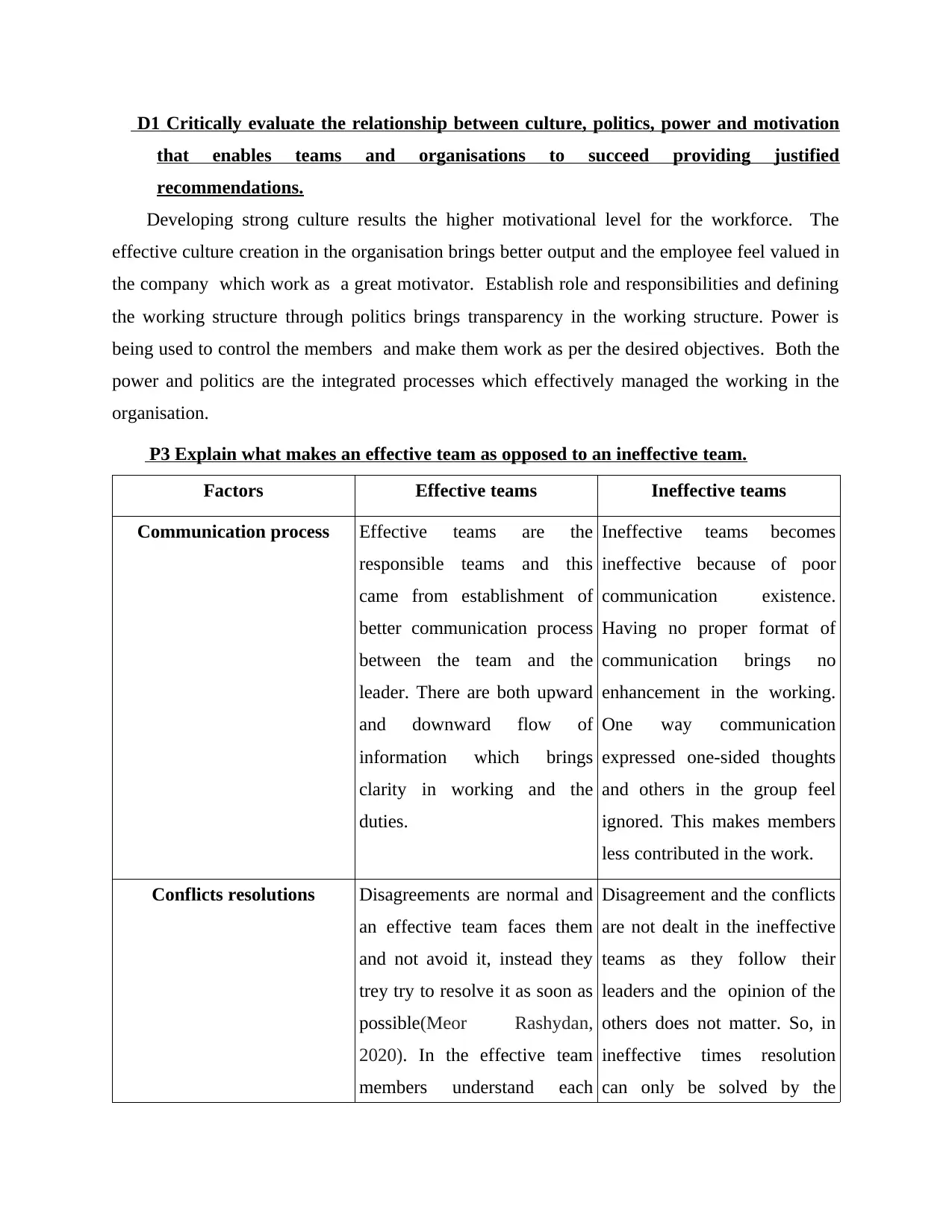
D1 Critically evaluate the relationship between culture, politics, power and motivation
that enables teams and organisations to succeed providing justified
recommendations.
Developing strong culture results the higher motivational level for the workforce. The
effective culture creation in the organisation brings better output and the employee feel valued in
the company which work as a great motivator. Establish role and responsibilities and defining
the working structure through politics brings transparency in the working structure. Power is
being used to control the members and make them work as per the desired objectives. Both the
power and politics are the integrated processes which effectively managed the working in the
organisation.
P3 Explain what makes an effective team as opposed to an ineffective team.
Factors Effective teams Ineffective teams
Communication process Effective teams are the
responsible teams and this
came from establishment of
better communication process
between the team and the
leader. There are both upward
and downward flow of
information which brings
clarity in working and the
duties.
Ineffective teams becomes
ineffective because of poor
communication existence.
Having no proper format of
communication brings no
enhancement in the working.
One way communication
expressed one-sided thoughts
and others in the group feel
ignored. This makes members
less contributed in the work.
Conflicts resolutions Disagreements are normal and
an effective team faces them
and not avoid it, instead they
trey try to resolve it as soon as
possible(Meor Rashydan,
2020). In the effective team
members understand each
Disagreement and the conflicts
are not dealt in the ineffective
teams as they follow their
leaders and the opinion of the
others does not matter. So, in
ineffective times resolution
can only be solved by the
that enables teams and organisations to succeed providing justified
recommendations.
Developing strong culture results the higher motivational level for the workforce. The
effective culture creation in the organisation brings better output and the employee feel valued in
the company which work as a great motivator. Establish role and responsibilities and defining
the working structure through politics brings transparency in the working structure. Power is
being used to control the members and make them work as per the desired objectives. Both the
power and politics are the integrated processes which effectively managed the working in the
organisation.
P3 Explain what makes an effective team as opposed to an ineffective team.
Factors Effective teams Ineffective teams
Communication process Effective teams are the
responsible teams and this
came from establishment of
better communication process
between the team and the
leader. There are both upward
and downward flow of
information which brings
clarity in working and the
duties.
Ineffective teams becomes
ineffective because of poor
communication existence.
Having no proper format of
communication brings no
enhancement in the working.
One way communication
expressed one-sided thoughts
and others in the group feel
ignored. This makes members
less contributed in the work.
Conflicts resolutions Disagreements are normal and
an effective team faces them
and not avoid it, instead they
trey try to resolve it as soon as
possible(Meor Rashydan,
2020). In the effective team
members understand each
Disagreement and the conflicts
are not dealt in the ineffective
teams as they follow their
leaders and the opinion of the
others does not matter. So, in
ineffective times resolution
can only be solved by the
⊘ This is a preview!⊘
Do you want full access?
Subscribe today to unlock all pages.

Trusted by 1+ million students worldwide
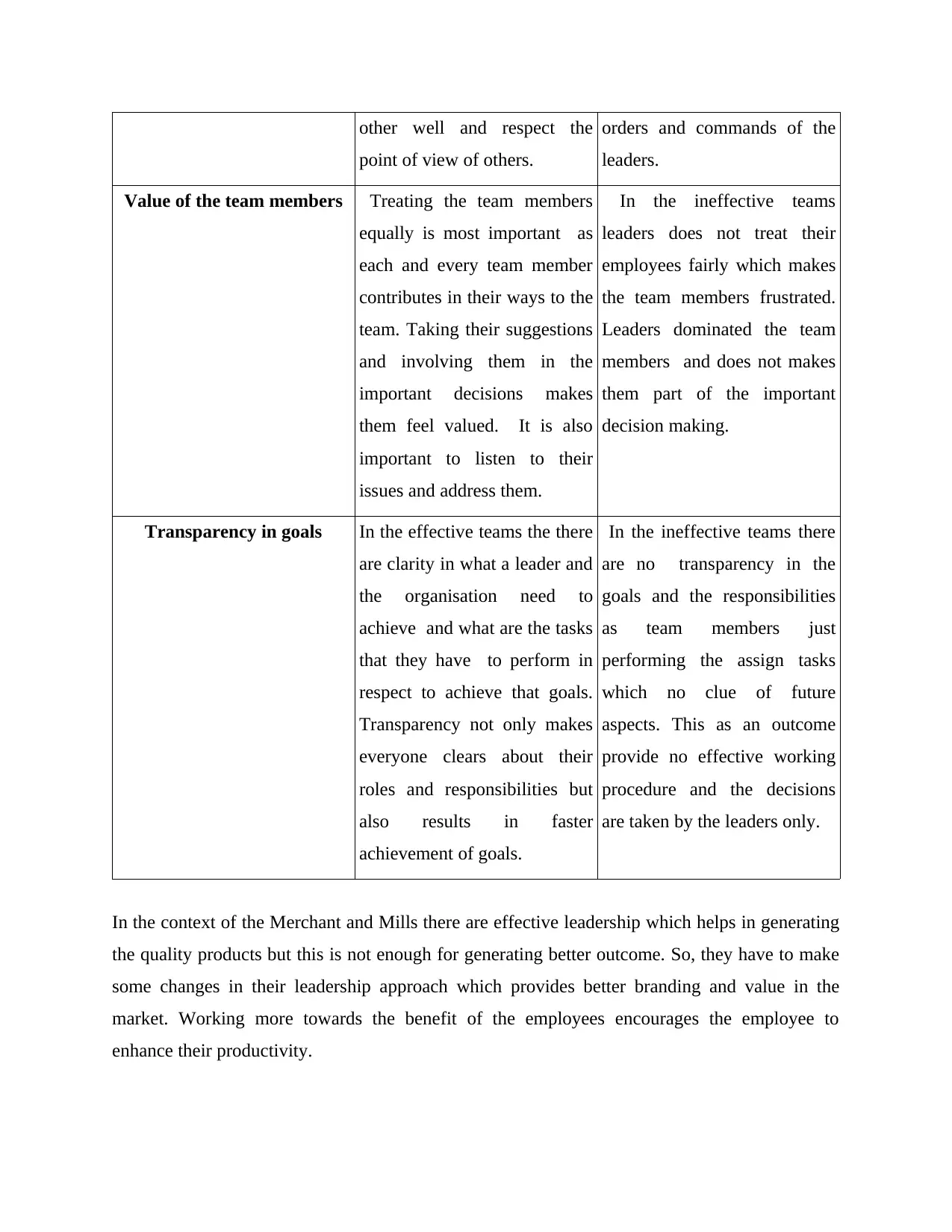
other well and respect the
point of view of others.
orders and commands of the
leaders.
Value of the team members Treating the team members
equally is most important as
each and every team member
contributes in their ways to the
team. Taking their suggestions
and involving them in the
important decisions makes
them feel valued. It is also
important to listen to their
issues and address them.
In the ineffective teams
leaders does not treat their
employees fairly which makes
the team members frustrated.
Leaders dominated the team
members and does not makes
them part of the important
decision making.
Transparency in goals In the effective teams the there
are clarity in what a leader and
the organisation need to
achieve and what are the tasks
that they have to perform in
respect to achieve that goals.
Transparency not only makes
everyone clears about their
roles and responsibilities but
also results in faster
achievement of goals.
In the ineffective teams there
are no transparency in the
goals and the responsibilities
as team members just
performing the assign tasks
which no clue of future
aspects. This as an outcome
provide no effective working
procedure and the decisions
are taken by the leaders only.
In the context of the Merchant and Mills there are effective leadership which helps in generating
the quality products but this is not enough for generating better outcome. So, they have to make
some changes in their leadership approach which provides better branding and value in the
market. Working more towards the benefit of the employees encourages the employee to
enhance their productivity.
point of view of others.
orders and commands of the
leaders.
Value of the team members Treating the team members
equally is most important as
each and every team member
contributes in their ways to the
team. Taking their suggestions
and involving them in the
important decisions makes
them feel valued. It is also
important to listen to their
issues and address them.
In the ineffective teams
leaders does not treat their
employees fairly which makes
the team members frustrated.
Leaders dominated the team
members and does not makes
them part of the important
decision making.
Transparency in goals In the effective teams the there
are clarity in what a leader and
the organisation need to
achieve and what are the tasks
that they have to perform in
respect to achieve that goals.
Transparency not only makes
everyone clears about their
roles and responsibilities but
also results in faster
achievement of goals.
In the ineffective teams there
are no transparency in the
goals and the responsibilities
as team members just
performing the assign tasks
which no clue of future
aspects. This as an outcome
provide no effective working
procedure and the decisions
are taken by the leaders only.
In the context of the Merchant and Mills there are effective leadership which helps in generating
the quality products but this is not enough for generating better outcome. So, they have to make
some changes in their leadership approach which provides better branding and value in the
market. Working more towards the benefit of the employees encourages the employee to
enhance their productivity.
Paraphrase This Document
Need a fresh take? Get an instant paraphrase of this document with our AI Paraphraser
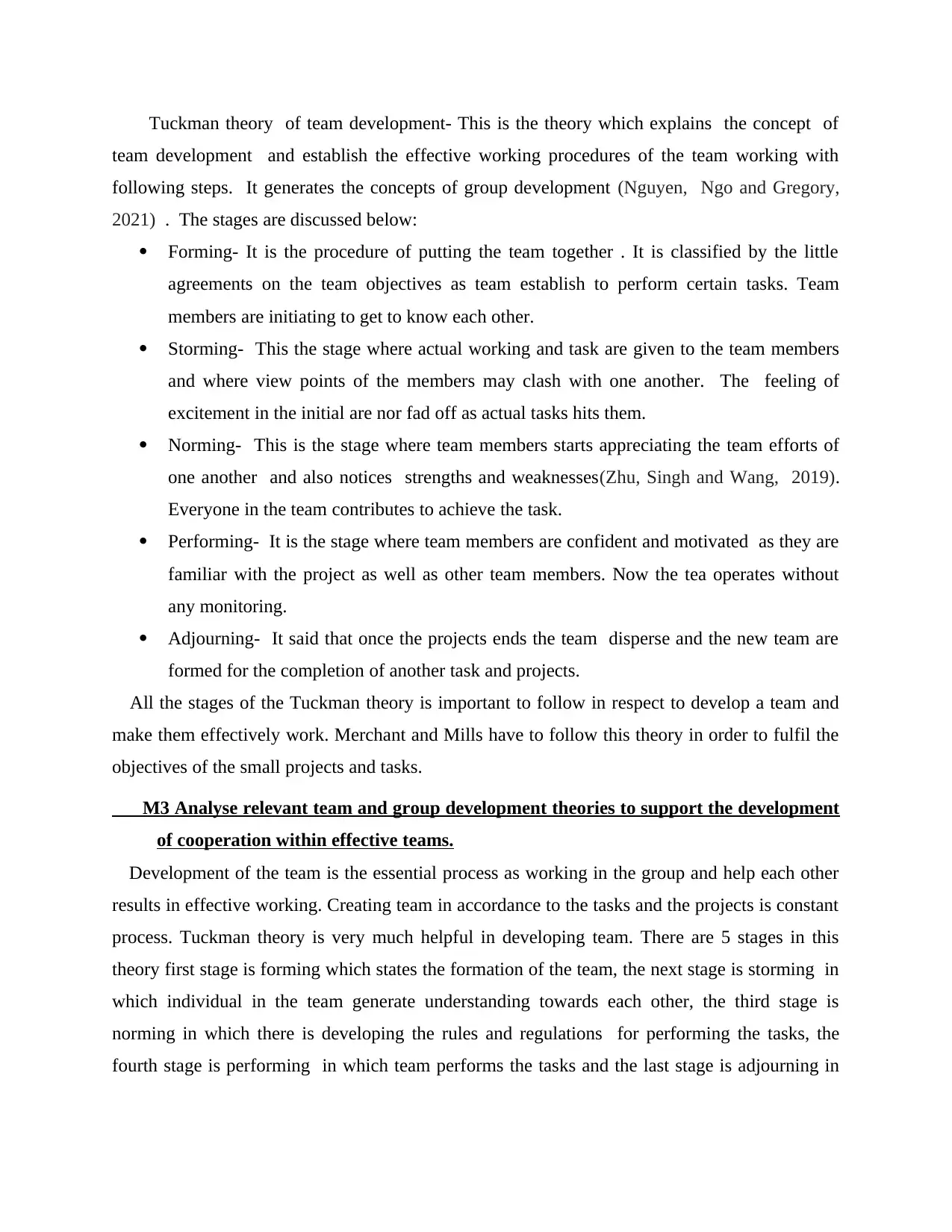
Tuckman theory of team development- This is the theory which explains the concept of
team development and establish the effective working procedures of the team working with
following steps. It generates the concepts of group development (Nguyen, Ngo and Gregory,
2021) . The stages are discussed below:
Forming- It is the procedure of putting the team together . It is classified by the little
agreements on the team objectives as team establish to perform certain tasks. Team
members are initiating to get to know each other.
Storming- This the stage where actual working and task are given to the team members
and where view points of the members may clash with one another. The feeling of
excitement in the initial are nor fad off as actual tasks hits them.
Norming- This is the stage where team members starts appreciating the team efforts of
one another and also notices strengths and weaknesses(Zhu, Singh and Wang, 2019).
Everyone in the team contributes to achieve the task.
Performing- It is the stage where team members are confident and motivated as they are
familiar with the project as well as other team members. Now the tea operates without
any monitoring.
Adjourning- It said that once the projects ends the team disperse and the new team are
formed for the completion of another task and projects.
All the stages of the Tuckman theory is important to follow in respect to develop a team and
make them effectively work. Merchant and Mills have to follow this theory in order to fulfil the
objectives of the small projects and tasks.
M3 Analyse relevant team and group development theories to support the development
of cooperation within effective teams.
Development of the team is the essential process as working in the group and help each other
results in effective working. Creating team in accordance to the tasks and the projects is constant
process. Tuckman theory is very much helpful in developing team. There are 5 stages in this
theory first stage is forming which states the formation of the team, the next stage is storming in
which individual in the team generate understanding towards each other, the third stage is
norming in which there is developing the rules and regulations for performing the tasks, the
fourth stage is performing in which team performs the tasks and the last stage is adjourning in
team development and establish the effective working procedures of the team working with
following steps. It generates the concepts of group development (Nguyen, Ngo and Gregory,
2021) . The stages are discussed below:
Forming- It is the procedure of putting the team together . It is classified by the little
agreements on the team objectives as team establish to perform certain tasks. Team
members are initiating to get to know each other.
Storming- This the stage where actual working and task are given to the team members
and where view points of the members may clash with one another. The feeling of
excitement in the initial are nor fad off as actual tasks hits them.
Norming- This is the stage where team members starts appreciating the team efforts of
one another and also notices strengths and weaknesses(Zhu, Singh and Wang, 2019).
Everyone in the team contributes to achieve the task.
Performing- It is the stage where team members are confident and motivated as they are
familiar with the project as well as other team members. Now the tea operates without
any monitoring.
Adjourning- It said that once the projects ends the team disperse and the new team are
formed for the completion of another task and projects.
All the stages of the Tuckman theory is important to follow in respect to develop a team and
make them effectively work. Merchant and Mills have to follow this theory in order to fulfil the
objectives of the small projects and tasks.
M3 Analyse relevant team and group development theories to support the development
of cooperation within effective teams.
Development of the team is the essential process as working in the group and help each other
results in effective working. Creating team in accordance to the tasks and the projects is constant
process. Tuckman theory is very much helpful in developing team. There are 5 stages in this
theory first stage is forming which states the formation of the team, the next stage is storming in
which individual in the team generate understanding towards each other, the third stage is
norming in which there is developing the rules and regulations for performing the tasks, the
fourth stage is performing in which team performs the tasks and the last stage is adjourning in
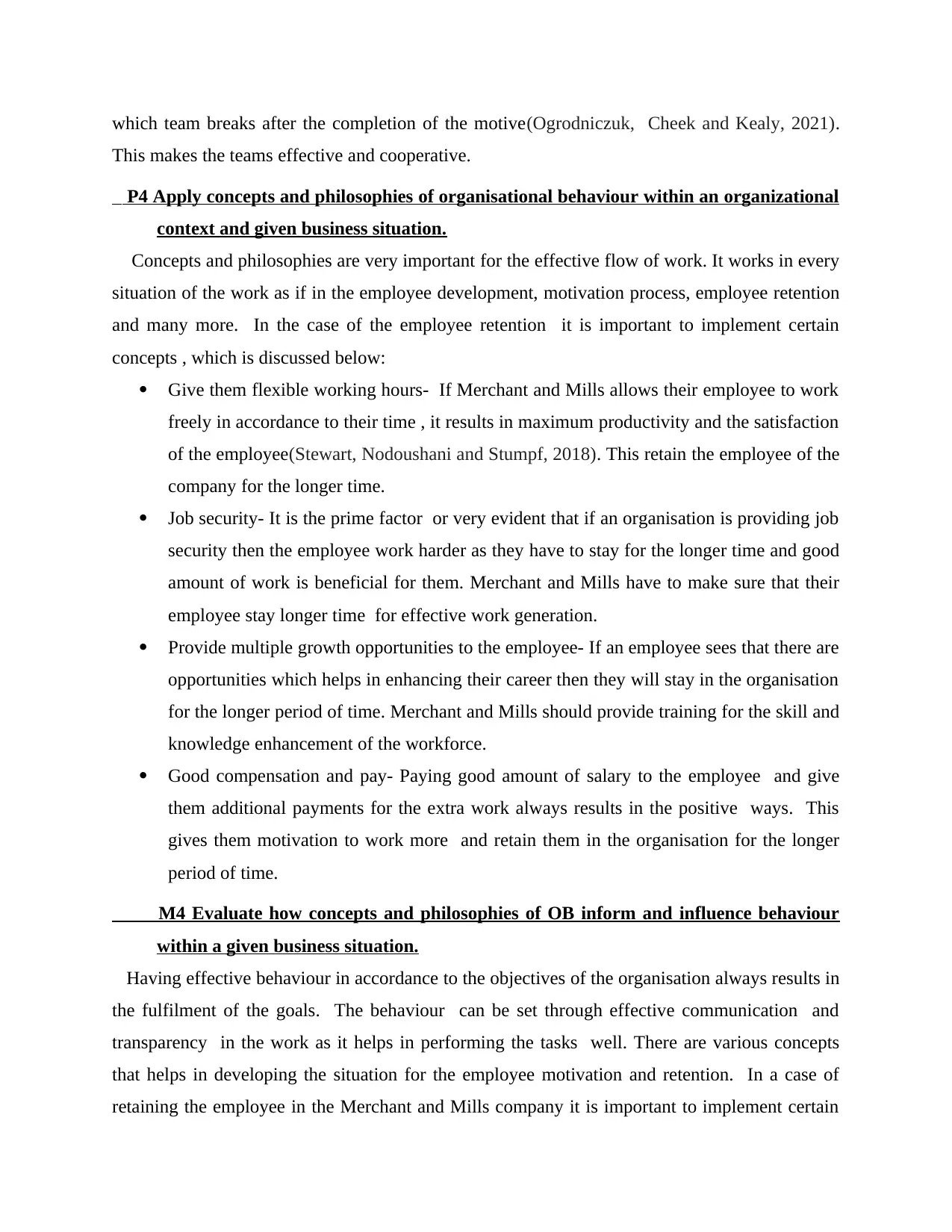
which team breaks after the completion of the motive(Ogrodniczuk, Cheek and Kealy, 2021).
This makes the teams effective and cooperative.
P4 Apply concepts and philosophies of organisational behaviour within an organizational
context and given business situation.
Concepts and philosophies are very important for the effective flow of work. It works in every
situation of the work as if in the employee development, motivation process, employee retention
and many more. In the case of the employee retention it is important to implement certain
concepts , which is discussed below:
Give them flexible working hours- If Merchant and Mills allows their employee to work
freely in accordance to their time , it results in maximum productivity and the satisfaction
of the employee(Stewart, Nodoushani and Stumpf, 2018). This retain the employee of the
company for the longer time.
Job security- It is the prime factor or very evident that if an organisation is providing job
security then the employee work harder as they have to stay for the longer time and good
amount of work is beneficial for them. Merchant and Mills have to make sure that their
employee stay longer time for effective work generation.
Provide multiple growth opportunities to the employee- If an employee sees that there are
opportunities which helps in enhancing their career then they will stay in the organisation
for the longer period of time. Merchant and Mills should provide training for the skill and
knowledge enhancement of the workforce.
Good compensation and pay- Paying good amount of salary to the employee and give
them additional payments for the extra work always results in the positive ways. This
gives them motivation to work more and retain them in the organisation for the longer
period of time.
M4 Evaluate how concepts and philosophies of OB inform and influence behaviour
within a given business situation.
Having effective behaviour in accordance to the objectives of the organisation always results in
the fulfilment of the goals. The behaviour can be set through effective communication and
transparency in the work as it helps in performing the tasks well. There are various concepts
that helps in developing the situation for the employee motivation and retention. In a case of
retaining the employee in the Merchant and Mills company it is important to implement certain
This makes the teams effective and cooperative.
P4 Apply concepts and philosophies of organisational behaviour within an organizational
context and given business situation.
Concepts and philosophies are very important for the effective flow of work. It works in every
situation of the work as if in the employee development, motivation process, employee retention
and many more. In the case of the employee retention it is important to implement certain
concepts , which is discussed below:
Give them flexible working hours- If Merchant and Mills allows their employee to work
freely in accordance to their time , it results in maximum productivity and the satisfaction
of the employee(Stewart, Nodoushani and Stumpf, 2018). This retain the employee of the
company for the longer time.
Job security- It is the prime factor or very evident that if an organisation is providing job
security then the employee work harder as they have to stay for the longer time and good
amount of work is beneficial for them. Merchant and Mills have to make sure that their
employee stay longer time for effective work generation.
Provide multiple growth opportunities to the employee- If an employee sees that there are
opportunities which helps in enhancing their career then they will stay in the organisation
for the longer period of time. Merchant and Mills should provide training for the skill and
knowledge enhancement of the workforce.
Good compensation and pay- Paying good amount of salary to the employee and give
them additional payments for the extra work always results in the positive ways. This
gives them motivation to work more and retain them in the organisation for the longer
period of time.
M4 Evaluate how concepts and philosophies of OB inform and influence behaviour
within a given business situation.
Having effective behaviour in accordance to the objectives of the organisation always results in
the fulfilment of the goals. The behaviour can be set through effective communication and
transparency in the work as it helps in performing the tasks well. There are various concepts
that helps in developing the situation for the employee motivation and retention. In a case of
retaining the employee in the Merchant and Mills company it is important to implement certain
⊘ This is a preview!⊘
Do you want full access?
Subscribe today to unlock all pages.

Trusted by 1+ million students worldwide
1 out of 14
Related Documents
Your All-in-One AI-Powered Toolkit for Academic Success.
+13062052269
info@desklib.com
Available 24*7 on WhatsApp / Email
![[object Object]](/_next/static/media/star-bottom.7253800d.svg)
Unlock your academic potential
Copyright © 2020–2026 A2Z Services. All Rights Reserved. Developed and managed by ZUCOL.

